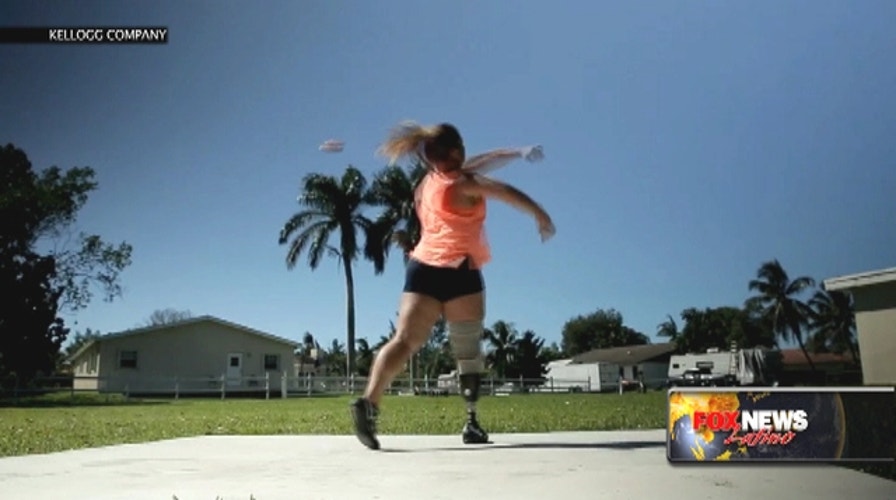Natalie Bieule, U.S. Paralympic discus thrower
U.S. Paralympic discus thrower Natalie Bieule talks about the accident in which she lost her leg, her Cuban grandfather and her inspiration -- her 2 daughters.
The only thing Natalie Bieule remembers is being extracted from her vehicle with the jaws of life.
Bieule was just 18 years old and deeply involved in dance in March 2001 when her car was hit by a drunk driver. “I just kept thinking to myself, 'I gotta stay alive,'” she said about wanting see her own mother and father again.
Doctors amputated Bieule’s right leg, and the accident could have easily been the end of her life, but instead it served as a catalyst for her incredible journey to becoming a world-class discus thrower. Ranked third in the world, Bieule is well on her way to representing the U.S. at her first Paralympic Games in Rio de Janeiro this September.
For the mother of two, the road to Rio began with a chance encounter 12 years after her accident. Bieule became heavily involved with CrossFit over the years and had been "breaking prosthetic legs left and right," she said, so she went to a conference in Orlando in 2013 in the hope of finding a sponsor to support her.
At one event, Paralympian gold-medal sprinter April Holmes immediately noticed Bieule from across the room. “In a sea of people, you with those legs – come over here,” Bieuleu recalled Holmes saying in front of everyone.
“That changed my life,” the South Florida native said. “My mother showed me about the Paralympics back when my accident happened, and the first thing that I had seen was a picture of [Holmes]. I was just inspired by this woman, and it was just crazy how the stars aligned for me.”
"We gotta get you on Team USA," she remember Holmes saying.
Two days later, Bieule, a Cuban-American who lives in Pembroke Pines, Florida, received a call from the head of the United States Track and Field Paralympic Committee, who told her the team was in need of a discus thrower.
“The only thing that I ever threw was a softball,” she says. “That was my foot in the door – it was now or never, so I said, 'OK, I’ll start training.'”
Seven months after throwing a discus for the first time she made the national team, and in 2014 she won her first national title while setting an American record.
For Bieule, discus is a natural fit. Her body had muscle and strength thanks to CrossFit, but more importantly, she says, her years as a dancer before the accident have helped her as well.
“It [involves] a lot of hip movement,” Natalie explained. “A lot of steps, and I just feel that dance. You gotta find that rhythm to know when that prosthetic leg is coming down. I have to find that beat to make it a beautiful, perfect throw. Everyone thinks it’s upper body strength, but there’s a lot of footwork that goes into it.”
The mother of two daughters – a 7- and a 1-year-old – says the training is rigorous and finding a routine is tough, but she finds a way to train for six hours a day in a gym on their farm.
In times of doubt, Bieule says she thinks of her grandfather, Joaquín, with whom she would watch the Olympics as a kid. He lost a leg to cancer, but stayed active until his death at 69.
She says a bird every now and then appears perched up in the barn, which she believes is him watching.
“I always feel like he’s followed me on this journey. It was his dream,” Bieule said. “He's had a lot to do with this journey. It makes me happy to know he’s watching.”
Bieule is a shoo-in to make the national team in Rio, and she can’t wait to make her family, her country and her grandfather proud.

